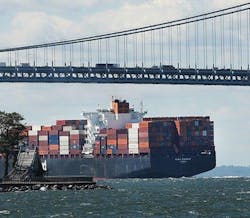Ocean Carrier Deploys Blockchain Technology
Since July 2016, shippers must ensure that an accurate Verified Gross Mass (VGM) is provided to the terminal/carrier for every container loaded prior to it being allowed to be shipped on-board on a vessel. These regulations apply to contracting governments to the International Maritime Organization’s SOLAS treaty (International Convention for the Safety of Life at Sea).
One method to provide this information is using a blockchain solution. The blockchain is a data structure that makes it possible to overcome the issue of delays due to accessing data that is in grained in old legacy systems.
This technology creates a permanent digital public ledger of transactions which can be shared among a distributed network of computers. It uses cryptography to allow each participant on the network to add to a record on the ledger in a secure way without the need for a central authority. Designated parties can record and retrieve data from anywhere in the world using mobile phones, tablets and PCs, eliminating the need for costly, proprietary infrastructure.
MTI (Marine Transport International (UK) Limited) has announced that it has deployed the blockchain technology. Using the TrustMe solution, the blockchain data is verified, immutable, and globally accessible, making it a suitable technology for solutions like the SolasVGM product.
”Blockchain has the ability to empower our industry into a true digital age,” explains Jody Cleworth, CEO of MTI. “Instead of a VGM message being delivered sequentially to parties within the supply chain, our platform can provide a decentralized approach to delivering VGM messages. The sheer volume of containers processed per year means that safely decentralizing the management of these containers will radically reduce the complexities of shipping. A grass roots approach in collecting and storing information on the blockchain is how shippers will be able to reap the full benefits of the technology. “
Companies will be able to build efficient business ecosystems between supply chain parties or actors in the public blockchain. The blockchain will also accelerate the flow of data distributed between parties, whilst at the same time reducing reliance on the typical IT architecture that plaque companies today.
With millions of transactions processed each day in the shipping industry, the public blockchain will not only increase data efficiency, but also provide long term savings for EDI transmission (electronic data interchange) dependent companies.
